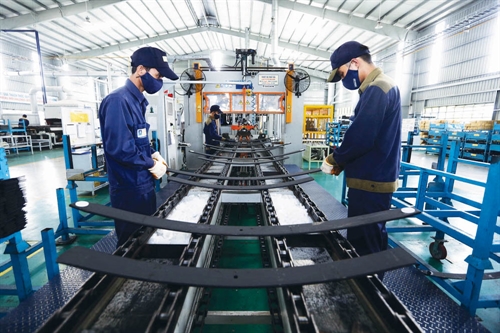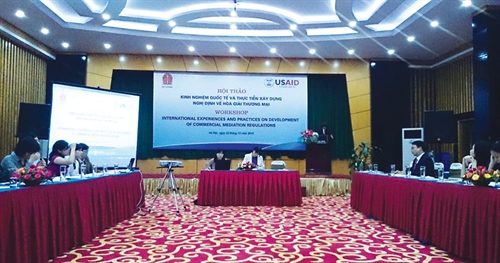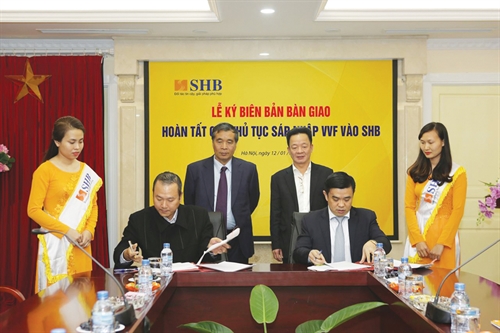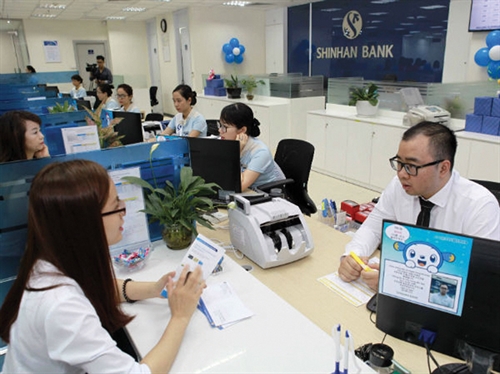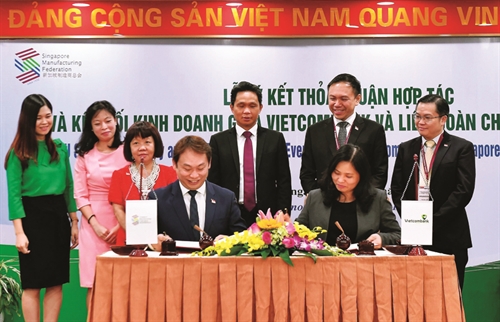The Law on Small- and Medium-Sized Enterprises was passed by the National Assembly last year in a hope to facilitate the formulation of comprehensive support policies and programs for these subjects. This article highlights novel points of the Law.
Dang Minh Phuong[1] and La Minh Trang[2]
In Vietnam, small- and medium-sized enterprises (SMEs) account for approximately 97 percent of the number of enterprises nationwide[3]. According to statistics[4] released by the Ministry of Planning and Investment, in 2017, the number of enterprises registered for establishment saw a record of 126,859, of which businesses with a registered capital of under VND 100 billion made up around 99 percent. With the average registered capital of a newly established enterprise reaching VND 10.2 billion, SMEs pump at least VND 1,280 trillion (USD 52.6 billion) into production and business activities, much higher than the amount of USD 35.9 billion of registered foreign direct investment in Vietnam in the same year. SMEs are also providing employment accounting for more than half of the country’s workforce and annually generate one million new jobs.
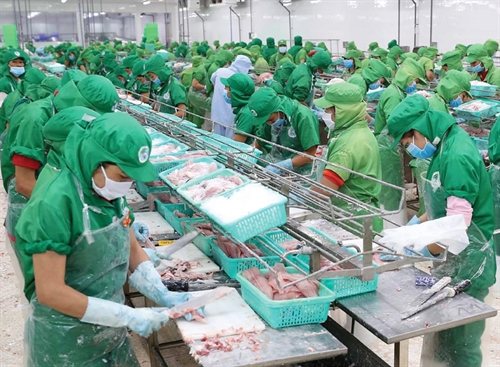 |
| Processing Tra catfish for export in a frozen fish processing plant in Dong Thap province__Photo: Vu Sinh/VNA |
Since 2001, the Vietnamese Government has adopted many regulations providing incentives and supports for these enterprises. However, these regulations, namely Decree 90 of 2001 and Decree 56 of 2009, are just sub-laws, while support programs for SMEs remain scattered and are not well integrated with one another, thus failing to bring about satisfactory results .
To address these problems, the National Assembly last year passed the Law on Small- and Medium-Sized Enterprises (the Law). The promulgation of the Law is expected to facilitate the formulation of comprehensive support policies and programs for SMEs in conformity with the national economic development goals in general and the potential and advantages of each locality in particular, aiming to increase the competitiveness of these enterprises.
Compared to previous regulations, the Law, which came into force on January 1 this year, has many novel points.
More specific criteria for identifying SMEs
Similar to Decree 59 of 2009, under the Law, SMEs are categorized into micro-enterprises, small-sized enterprises, and medium-sized enterprises. However, while Decree 59 stipulates that SMEs are those having business registration[5], the Law governs only enterprises established, organized and operating in accordance with the law on enterprises[6]. In other words, the Law excludes cooperatives and business households from being eligible for incentives and supports for SMEs.
It is believed that a narrower scope of eligibility for incentives and supports to enterprises established in accordance with the law on enterprises is suitable to the current situation.
All matters concerning cooperatives have been provided in detail by the Law on Cooperatives and its guiding texts. So, the exclusion of cooperatives will help concentrate resources for SMEs, with priority given to startups and SMEs engaged in production and processing activities. As business households still seem hesitant about moving from the informal to formal sector[7], the new regulation will serve as a stimulus for them to transform themselves into enterprises.
The Law sets out two criteria for identifying SMEs. Accordingly, an enterprise will be considered an SME if: (i) it has an average number of employees covered by social insurance not exceeding 200 in a year and (ii) it has a total capital not exceeding VND 100 billion (approximately USD 4.4 million) or earns a total turnover not exceeding VND 300 billion (about USD 13.2 million) in the preceding year.
As enterprises with the same number of employees usually have similar particularities and enjoy the same incentive and support policies, headcount is a useful criterion which makes the identification of SMEs easier. For that reason, the Law maintains this criterion, which was initially introduced in Decree 59. However, it reduces the maximum number of employees of a SME to 200 from 300 as set in the previous regulation.
In addition to the criterion of capital for identification of SMEs, the Law offers another new option, namely turnover. It can be said that turnover reflects the actual operation and size of a business. Additionally, turnover also serves as a ground for banks to extend credit to enterprises. Hence, the application of the criterion of turnover is in line with the objective of supporting the development of SMEs. An enterprise that has a low turnover and operates inefficiently needs support to improve its performance. In fact, some state management agencies have used turnover as a basis for determining enterprises’ eligibility for such incentives as corporate income tax rates and tax incentives.
Sources of funding for SMEs
Statistics show that SMEs’ contribution accounts for about 45 percent of the GDP and 31 percent of total budget revenues[8]. These rates are meaningful given the fact that the total budget revenues in 2016 mounted to over VND 1,100 trillion (USD 49.3 billion). No one can deny the greater and greater contribution of SMEs to the national economic development. Therefore, it it extremely necessary to facilitate SMEs’ access to various sources of support.
The biggest shortcoming of Decree 56 is that it introduces incentive and support policies for SMEs but is silent about the sources of funds for the realization of these policies.
The Law now addresses such inadequacy. Article 6 makes it clear that: “Funding sources for supporting SMEs include credit supported and guaranteed by the State; state budget funds; exempted and reduced taxes, charges, fees, land rental, land use levy and other amounts payable to the state budget in accordance with law; and lawful funds of domestic and foreign organizations and individuals.”
Noticeably, under the Law, funds to support SMEs do not rely on the state budget only but come from various sources. Non-state entities such as economic organizations, business societies and other organizations and individuals at home and abroad can be called upon to support SMEs to improve their competitiveness and operate sustainably.
Special supports for three particular types of SMEs
In addition to the common supports offered to all SMEs such as those related to credit and tax, production ground, technology and market expansion, the Law devotes Section 2 of Chapter II to providing supports particularly designed for SMEs transformed from business households, innovative startups and SMEs participating in industrial clusters and value chains.
Supports for SMEs transformed from business households
The Vietnamese law on enterprises has persistently encouraged business households to transform into enterprises[9]. As for those employing 10 or more workers on a regular basis, the law requires them to register as enterprises for lawful operation[10].
However, statistics show that out of the total number of five million business households nationwide[11], just 8.7 percent of business households with a capital of between VND 1-5 billion and around 5.6 percent of business households employing more than 10 laborers have ever weighed the pros and cons of transformation into enterprises[12]. Although business households play an important part in the economy, there remain several problems hindering these entities’ operation such as unplanned operation, poor governance, lack of transparency and failure to ensure laborers’ lawful rights and interests.
Hence, specific supports for SMEs transformed from business households will boost the movement of these entities to the formal sector, create conditions for them to access more resources and help ensure lawful rights and interests of employees, employers and related parties.
Under the Law, in addition to common supports available to SMEs, SMEs transformed from business households are entitled to free counselling and guidance on formalities for transformation into enterprises; free tax and accounting counselling for three years after transformation; and corporate income tax and land use levy exemption and reduction.
Supports for and investment in startups
Over recent years, startups have become a hot topic and affirmed their great development potential. As most of startups are SMEs, they are keen for encouragement and support so as to be able to grasp the chance for development. The Law now lends them a hand, reserving Articles 17 and 18 to specify supports for and investment in startups being SMEs.
Specifically, startups will be entitled to support in technology application and transfer; in-depth training in making and development products; information, and communication and trade promotion. They will also be provided with interest rate subsidy when borrowing bank loans.
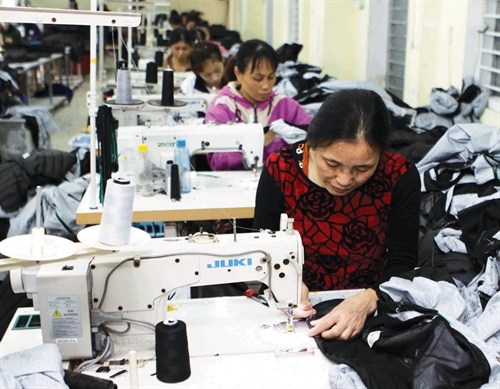 |
| Workers in the garment sewing line of Tang Tien Dat Construction and Trade Joint-Stock Company (Nghe An province)__Photo: Thanh Tung/VNA |
One of the biggest challenges facing startups is difficulty in access to funding sources. To solve this problem, Article 18 of the Law permits the formation of innovative startup investment funds, which by nature are venture investment funds, from capital contributed by private investors. These funds will finance startups through contributing capital to or purchasing shares from these enterprises. Additionally, in order to create a momentum for development of startups, local administrations may ask state financial institutions in their localities to contribute capital to startups for a definite period of time.
In reality, startup investment funds play an important role in the development of a startup eco-system. These funds are not purely capital providers but also supporters for startups in business strategy formulation, brand building and product distribution. Therefore, the institutionalization of startup investment funds can be seen as a remarkable point of the Law which will create a premise for the formulation of a legal foundation for startup investment activities in Vietnam.
Supports for SMEs participating in industrial clusters and value chains
The third group entitled to special supports consists of SMEs participating in industrial clusters and value chains.
An industrial cluster refers to a form of cooperation and connection among enterprises in the same industry and allied enterprises and related organizations for higher competitiveness. Meanwhile, value chains are associated activities that create added value for products or services, including a series of successive stages from concept, product design, manufacture to distribution.
As industrial clusters and value chains help increase concentration within a certain industry, once enterprises, particularly SMEs, participate in these forms of association, they will have a chance to get easier access to input elements, information, technology, human resources and suppliers and, as a result, increase their productivity.
Therefore, the provision of more supports for SMEs participating in industrial clusters and value chains under the Law will remedy the lack of connection among SMEs while increasing the competitiveness of and forming sustainable value chains for national key products.
Issues that need improvement
Firstly, although the Law lists support policies and mechanisms applicable to SMEs and defines their beneficiaries, it still fails to specify the principles, methods and conditions for implementation of these policies and mechanisms. It is not to mention that some articles, for example Article 10 on tax and accounting supports, do not introduce new policies but simply refer to other legal documents.
Reality shows that the problem currently facing SMEs is not the lack of support policies and mechanisms but the difficulties and shortcomings in their implementation. Their biggest concern is not what incentives and support they are entitled to but how they will receive them. If wishing to boost the sustainable development of SMEs, the State should devise comprehensive measures in terms of finance, technology, information access and legal assistance rather than providing them with “physical support” (providing what enterprises lack). The Law should offer a mechanism for consistent and effective implementation of support measures so as to help enterprises quickly enjoy incentives and supports they are entitled to.
Secondly, the Law still lacks specific provisions on how to mobilize and use funds for supporting SMEs. Looking at the Law’s provisions on funding sources for supporting SMEs, one can easily notice that most funds come from the state budget. Meanwhile, it remains unclear about the mechanism for mobilizing supports from the non-state sector. Given national budget revenue sources remain limited, the placement of such funding burden on the State will render the implementation of the Law difficult. In addition, the mobilization of sources from the state sector is a time-consuming process as it must go through several steps, from cost estimation and appraisal to approval and finalization. It is not to mention that the number of SMEs eligible for support is huge, accounting for up to 97 percent of enterprises nationwide. For these reasons, it is extremely necessary to mobilize sources from the private sector to provide support for SMEs.
In sum, the Law has created a legal framework of the highest legal effect which has direct impacts on the provision of supports for SMEs. It places SMEs at the central position, offering them with great advantages in terms of capital, human resources, information access, etc. while urging management agencies to accompany and support them to improve their competitiveness.-
